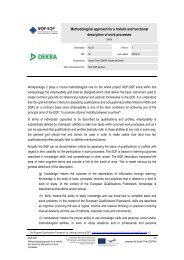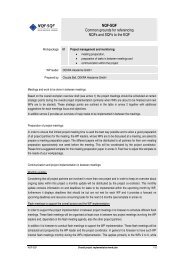Overview of National Qualification frameworks - Project-Nqf-Sqf
Overview of National Qualification frameworks - Project-Nqf-Sqf
Overview of National Qualification frameworks - Project-Nqf-Sqf
You also want an ePaper? Increase the reach of your titles
YUMPU automatically turns print PDFs into web optimized ePapers that Google loves.
- upper cycle, grades 12-13, organised in technological high schools, leading tothe award <strong>of</strong> qualification certificate, level 3 (ISCED).3. Post-secondary education- post high school – which is a specialised training route <strong>of</strong> 1-3 years duration,leading to the award <strong>of</strong> competence certificate, level 3 advanced (ISCED);- the foremen school is post high school education providing pr<strong>of</strong>essional training<strong>of</strong> foremen for technical and vocational education and for economy; this leads tothe award <strong>of</strong> competence certificate, level 3 advanced (ISCED).• Higher education- University educationRomanian higher education is structured on three cycles: Bachelor - usually three years (except Medicine, Pharmacy, Law,Architecture etc.) Master – two years• Doctorate – three years with the possibility <strong>of</strong> prolonging the duration by oneyear.- Post-university education• Adult Education<strong>Qualification</strong>s acquired outside the formal educational system are awarded upon completion<strong>of</strong> training programmes organised by training providers for IVET and CVET.3 Referencing the EQF__ Which tools are used to create an interface to EQF?__ How are interfaces between the NQF and the EQF defined? How is it managed? Howare learning outcomes from EQF accredited in the NQF?The timing for the referencing to the EQF has yet to be fixed, but preparations have started.The <strong>National</strong> <strong>Qualification</strong>s Authority, the <strong>National</strong> Agency for Quality Assurance in HigherEducation and the <strong>National</strong> Agency for Quality Assurance for Pre-university Education (IVET)are working within their level <strong>of</strong> competence. The national steering group for referencing has yetto be decided.__How are qualifications from an education abroad generally accredited? Who isresponsible for those definitions and accreditation?<strong>Qualification</strong>s obtained abroad are recognised by the <strong>National</strong> Centre for Recognitionand Equivalence <strong>of</strong> Diplomas, authority within Ministry <strong>of</strong> Education.Pre-university diplomas and certificates obtained abroad are recognised either or byapplying knowledge tests/equivalence examinations/adaptation periods/study periods, dependingon the differences between the Romanian and the respective foreign system.Higher education diplomas, certificates or scientific degrees obtained abroad arerecognised after NCRED has acknowledged that the studies undertaken abroad are compatiblewith the study programme or qualifications in Romania, in terms <strong>of</strong>:• status <strong>of</strong> higher education institution issuing the diploma/certificate/degree• diploma level• number <strong>of</strong> study years/credits accumulated• study field• pr<strong>of</strong>ile• specialisation




